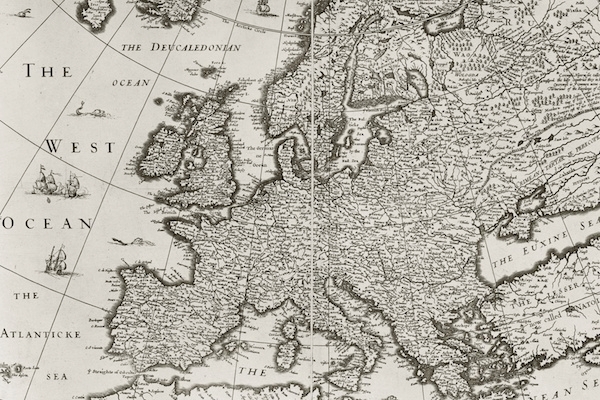I sometimes think that, by the time I die, my entire life will have been blighted by sterile, unresolved arguments about Europe. I have to admit that the foundation of the European Coal and Steel Community in 1951 made little impression on me at the time; but I was only 11 years old, Britain wasn’t involved in it, and I had no idea in any case what it was all about. It was, of course, the precursor to the European Economic Community, created in 1957 by the Treaty of Rome; but by then I was 17 and thought it sounded a very good idea, for its main purpose appeared to be to prevent for ever the recurrence of a European war. Having been lucky as a baby to survive a German bomb attack that blew out the bottom two floors of an apartment block beside St Paul’s Cathedral in which I was sleeping in my parents’ flat on the fourth floor, this seemed like a very good idea, and I reproached my country for its snooty attitude towards such a noble ambition.
I was also beginning to feel rather ‘European’, having studied German at Eton under John le Carré (Mr Cornwell, as we boys then knew him) and, during 1958, the year in which the EEC came into existence, spent six months in Vienna practising my German before going up to Cambridge to read it. Vienna was then a wretched city full of maimed war veterans and despised Hungarian refugees, its population only just beginning to recover from ten years of Allied — but especially Russian — occupation. And this confirmed me in my view that European integration, if it served to prevent war, would be well worth some sacrifice of national independence.
In 1960, as a student at Cambridge, I went to Berlin (a city split between east and west, but not yet by a wall) to attend a conference of young Britons and young West Germans. The British delegates, almost equally divided between young Socialists and young Conservatives (one of the Socialists being John Smith, the future Labour leader), showed no interest whatsoever in the opinions of their friendly and intelligent German counterparts and spent most of the time arguing acrimoniously among themselves. It was a display of parochialism and bad manners that I recalled three years later when, living then in Milan, I heard General de Gaulle deliver his first veto on British membership of the EEC and found myself reluctantly seeing his point when he described England as ‘insular’ and quite different from the countries of the Continent in her ‘very marked and very original habits and traditions’.
Four years later, in 1967, when I was about to embark on a four-year stint in Rome as a Reuters correspondent, thus consolidating my Europeanism, the French president delivered a second veto, accusing Britain of ‘deep-seated hostility’ to European construction and a ‘lack of interest’ in the Common Market. Once again, he might have had a point, but Britain could not tolerate rejection by a French president of all people; and once de Gaulle had left office in 1969, it renewed its application for EEC membership and finally met with success in 1973 under the premiership of Edward Heath. The Harold Wilson referendum of 1975, in which the British voted by more than two to one for staying in, came at an opportune moment for me personally, since The Spectator, of which I was shortly to become editor, had campaigned vociferously for withdrawal. With the matter, as I supposed, finally settled, there was no need for us to set out a new policy on Europe; we could simply stop talking about it.
Well, did you ever? Here we are, nearly 40 years later, and the matter hasn’t been settled at all. In fact, we are more steamed up about it than ever. And in 2017, if I’m still alive at 77, I will be invited to vote in another in-or-out referendum. Even though the high ideals that originally inspired the creation of Europe have now come to seem dated and even irrelevant, I can’t see myself voting for withdrawal. I still like the idea of a European family of nations, for we have much more in common than any European country, even Britain, has with the United States, which is wonderful but very foreign. Furthermore, I can’t see what advantage withdrawal would bring, and I agree with Boris Johnson that we British, with our sloth and self-indulgence, are mainly responsible for our own economic plight.
So while I won’t vote for withdrawal, part of me hopes that the quitters will win. For if they do, the matter really will be settled once and for all, sincwe the other EU member states will never have us back in, however much we beg. Then there should at last be peace — no more ranting against Brussels, no more Euro hysteria or paranoia — and maybe I would be granted just a year or so of peace before my time is up.






Comments